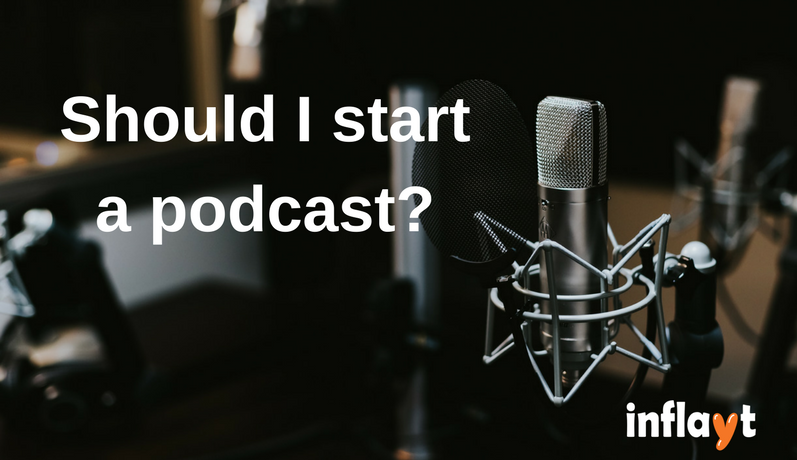Podcasts are raging in popularity as a tool of an inbound marketing strategy. In fact, iTunes is currently flooded with over 50,000 podcasts. So is it a good idea for your business to start a podcast? There are some successful companies that take their podcasts to over 100 episodes and gain subscribers throughout the course of it. Others find it difficult to sustain after a few episodes.
Why do you want to start a podcast?
First you must understand your “why.” Do you want to host a podcast to meet influencers and build your personal brand? Do you want to add podcasting as a part of your inbound marketing strategy? Great! However, if your goal is to generate quick leads, you may be up for a disappointment. With so many podcasts available, it is difficult to organically bring in a lot of subscribers in a short time. Podcasting should be seen as a long term investment.
Whatever your reason, you should understand that the cost involved in creating a series of podcasts is a major constraint.
You should be willing to spend a minimum of $1000 per month to create podcasts, and that is just on labor. Other aspects like planning, bringing a host on board, editing, and distribution require a bigger investment. Also, it takes at least 6-7 months to start seeing a return on your investment. So, if your goal is to generate quick leads, podcasts may not be the best option for you.
Okay then who is podcasting ideal for?
If your business is selling a product or service worth thousands of dollars per purchase, then podcasting is a great way to engage your customers. You can generate good revenue from the time and resources you spend on your podcasts as the investment is only a fraction of the potential profit. Such businesses can see a quick return on investment. For smaller businesses, podcasting will still be a good way to generate leads but it may take about 3 to 5 years to generate returns.
Some organizations decide to stop their podcasts after a few episodes because the product is not worth the investment. Services or products that bring about $200 per month cannot afford the investment of $1000 per month for 6 or 7 months until returns can be generated. So with podcasting, your long term goal should be gaining subscribers to your podcasts. Then you can use that data to close sales in the future when the customer is ready to buy.
Who listens to podcasts?
Generally, organizations reach their customers through 3 different mediums, which are video, audio, and text format. It is very easy to create text content with a blog and improve it with search engine optimization for better reach, but the problem with text is that only a certain group of people are willing to read longform text. Video content is also engaging, and platforms like YouTube make it simple to host your video channel. However, a lot of work goes into creating a video, which makes it a huge investment.
Also, people find it to be time-consuming to spare their entire attention for a long video. But with podcasts, listeners don’t have to divert their entire attention or allot exclusive time. You could be working out in the gym and still listen to a podcast in leisure.
Successful podcasts that cross over 100 episodes do so because they have an engaged audience. That audience probably consumes both video and text content as well. But they enjoy podcasts as an alternative source of information. Podcasting is not a standalone tool to bring visitors or generate leads but an additional medium to supplement the process.
Your product’s worth and how long you are willing to wait for the return on your investment should be the most important factors guiding you in your decision to start your podcast.
Influencer guests are gold when you start a podcast
If you have decided to start your own podcast, it is important to recognize the potential of bringing influencers to your podcast for rapid audience expansion. Promoting your podcast in a own newsletter, Twitter, or Facebook page may not get the reach influencers bring. These influencers may be social media stalwarts and have a huge following, bringing them on board will immediately boost the visitors to your podcasts. This will help you generate great revenue from your podcasts and expand the reach of your brand. Utilize those relationships to spike your own influence.


Recent Comments